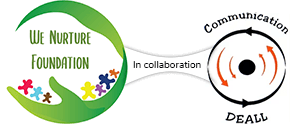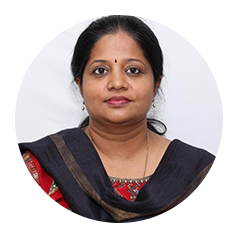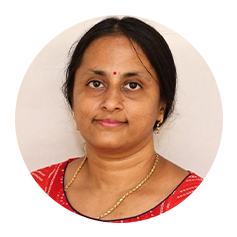About WE NURTURE FOUNDATION
We believe 'every child can'. No matter what the ability is, possibilities are endless. We help children meet their developmental goals.

We Nurture Foundation ensures every child gets a chance to lead a dignified and happy life.
We Nurture Foundation is a one-of-its-kind development centre, a registered not-for-profit public charitable trust, that provides integrated and interdisciplinary therapies, early intervention being one of the primary offerings, for children with neurodevelopmental disorders. What sets us apart is that we prepare them for life beyond intervention.
We provide children with learning tools, a supportive circle, educators who understand and nurture their strengths, and an individualized education plan that allows them to design their future in the best way possible.
Our Perspective
"Your child is autistic" These words, when pronounced by a doctor, can be devastating for any parent. As a caregiver of a special needs child, the journey ahead is bumpy and unclear, more so without a proper roadmap. The constant struggle to fit-in is stressful. A general verdict is that of lifelong dependency for the child and worry for the caregivers. However, that's not an accurate picture. ASD (Autism Spectrum Disorders) doesn't automatically mean that all doors to a fruitful life are closed. Early (and interdisciplinary) intervention ensures significant functional independence even in a child on the high end of the spectrum. More importantly, when detected early, it is known to reverse the graph for a child on the lower end of the spectrum.
The term 'Autism' is broad and encompasses myriad combinations and degrees of autistic behaviour. In many ways, it's an inappropriate terminology for diagnosis that can range from learning difficulties to sensory perception issues to ADHD, and so on. One child's behaviour could be vastly disparate from another due to different combinations of developmental problems. Plus, the growth challenges could appear to be within normal and acceptable parameters where the skills are acquired later than usual but without intervention. As a consequence, most parents with children on the autism spectrum find it difficult to accept their child's diagnosis and do not seek help (in time).
Developmental issues could be as mild and seemingly harmless such as a delayed speech or extreme stranger anxiety—most children overcome these challenges within an acceptable time range. It is natural for the caregiver to not pay attention to these tiny but significant red flags in a child's growing journey—or as severe as cognitive and socio-emotional shortcomings where the society labels the child. The caregivers are ignorant about remedial therapy and shy away from reaching out due to social stigma. Interestingly, even children who are not on the Autism spectrum can have neurodevelopmental challenges like impaired speech or learning difficulties. Such children also benefit immensely through speech therapy and occupational therapy.
Every non-acquired (or even regressive) skill can be connected to a previously unmet developmental condition that might seem very innocuous and can escape attention. For instance, experts observe that speech delays in preschoolers may have their roots in their inability to latch to the mother's breast as a newborn. A child's journey could have such red flags that might look random and yet reveal a specific pattern when connected. Since each child displays a unique pattern, corrective action needs to take a holistic route for remedy. This characteristic of ASD is unfortunately left unaddressed even by the medical fraternity. There's an urgent need to bridge this gap.
The We Nurture Foundation (WNF) program uses comprehensive tools and assessment checklists, adapted and improvised from the original 'Comdeall' program, to connect these dots and map a child's growth. Its well-defined methodology diagnoses the severity of a child's condition and identifies where the child lies on the vast spectrum of autism. The developmental journey is traced back, in an extremely detailed manner, to a previously unconnected dot, and earmarked for a corrective process.
The assessment checklists include, apart from broad milestones like an infant's ability to hold its neck independently or to sit with support, ones that could go unnoticed like the first smile or eye movement on seeing a brightly coloured object. Therapists observe the child keenly, collect comprehensive data after going over 3500 questions with the caregiver, covering these growth peg points, and after a thorough analysis, design an exclusive remedial therapy that's tailor-made for the child. The program has seen significant success with several children overcoming the developmental challenges.
The ComDeall program reports a high success rate with children getting integrated into the mainstream with 1-2 years of intensive intervention therapy. The success rates are higher for children admitted at an early age, as young as three-years-old. That is not to suggest that older children do not see an improvement. They do, but after a longer duration of therapy. Hence, early detection assumes such a critical role.
The WNF approach is holistic because it caters to the child as a whole rather than merely treating the symptoms. It being interdisciplinary ensures all the therapists work in tandem towards a combined goal, alongside external but impacting factors like family, health, nutrition and daily routine, to aid a consistent and effective remedial course.

Our Vision
Our primary goal is to help children with neurodevelopmental disorders integrate with the mainstream. Our broader aim is to identify and nurture their true potential through an inclusive learning space and prepare them for an independent and fruitful life in the functional world.
Meet the Professionals
Pillars of the Foundation

"I see a child as an individual who needs help rather than a set of problems to be fixed. My vision of founding We Nurture Foundation is to provide holistic treatment and improve the quality of life by addressing the physical, mental, and psycho-social development of a child."
Gayathri Ananth
Founder, Managing Trustee,
Early Interventionist and Educationist
Gayathri is a personal counsellor and an early intervention specialist, trained at the Com-DEALL Trust. She was instrumental in introducing the prestigious Com-DEALL Early Intervention Program at Ourspace Foundation, an organization she headed formerly. She improvised the Com-DEALL model in several areas that brought her recognition and accolades from the Com-DEALL trust.
She is an MBA (Finance) graduate with more than 12 years of experience in the financial industry and has handled various senior management roles at CRISIL; an experience she leveraged successfully as a trustee and head of Ourspace Foundation.
She is a certified child and adolescent counsellor and a trained Play Therapy and NLP practitioner. She has several courses in food and nutrition under her belt that seal her belief in studies that link food to the mental-and-physical health of children.

"Parenting is a journey, not a destination. Be it a typical child or a child with special needs, it is the quality of the journey that matters!"
Gowri Kalayamputhur Sivakumar
Trustee,
Masters in Special & Inclusive Education (U.K.)
Gowri’s journey of parenting a child with special needs introduced her to the field of special education, qualification followed later on. She believes that her constant need for answers to the many questions about her child’s day-to-day life has made her a better person, an intuitive parent, and an empathetic educator as well.
Having discovered her niche in this field, she wants to empower other parents who are on a similar journey. She strives to work with such children and unlock their potential.

"I believe these young and bright minds can reach great heights. I wish to be a part of their journey and make a difference."
Harini Srinivasan
Trustee,
MSc. Biotechnology, Developmental Psychologist,
Early Interventionist and Educationist
Harini started off as an educator 15 years ago but later pursued her career as a researcher. As a researcher in the field of Cell and Molecular Biology, Neuroscience, she has always approached every opportunity in life with an open mind. Working with children who experienced different developmental delays gave her deeper insights than several years of research. She discovered that children with developmental difficulties faced a wide range of challenges related to motor, social, emotional, sensory, perpetual, behavioural functions of the body. However, early detection and intervention in these areas made the skills simpler and attainable.
She is a strong advocate of Early Intervention as a means of support and educational system for young children with developmental delays. She believes that a holistic approach to help children with different needs requires a dedicated and individualized program. She dreams of planning and executing a program that provides a plethora of opportunities for young children with diverse needs.

"I am a mother of a child with autism. I quote this with utmost dignity as I navigate through the most enriching journey of my life."
Lakshmi Nandakumar
Trustee,
B.E. (Instrumentation and Electronics),
Counsellor
Lakshmi’s journey as a parent of a child with autism has broadened her perception to be able to view the larger picture and understand parental challenges. She’s committed to making a difference in the lives of the children and their families.
She is a family counsellor. Her personal story helps to connect with other parents. Her advice, therefore, comes from training as well as from the position of someone who has seen it all.




